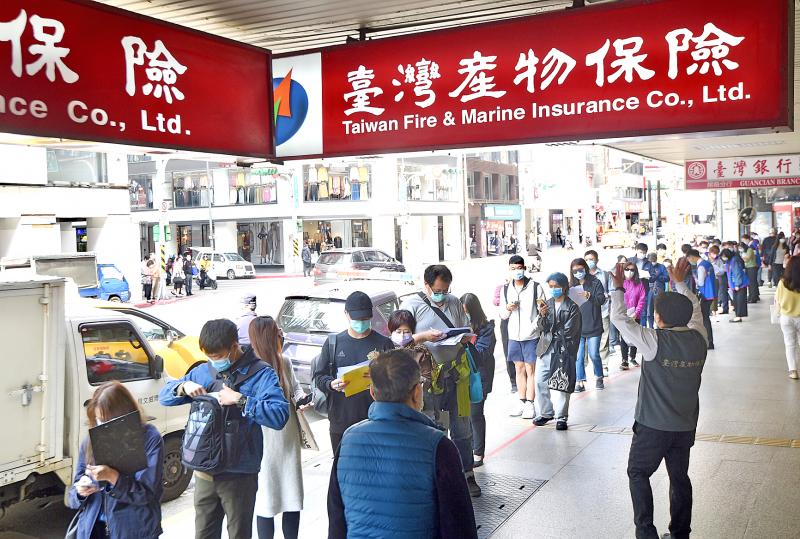As of Monday last week, Taiwan’s insurers had sold 7.15 million policies covering losses due to COVID-19-related quarantines and vaccine adverse reactions, up 42 percent from the end of last month, as a surge in COVID-19 cases prompted people to seek insurance coverage, Financial Supervisory Commission data showed on Thursday.
Ninety-one percent of them, or 6.51 million policies, are designed to cover losses incurred by people infected with the virus, or under quarantine or home isolation after being listed as a contact of a confirmed case, up 29 percent from 5.04 million policies sold at the end of last month, the data showed.
As of Monday last week, insurers’ cumulative sales totaled NT$4.06 billion (US$145.5 million), up 57 percent from NT$2.58 billion at the end of last month, the data showed.

Photo: Peter Lo, Taipei Times
Another 9 percent, or 640,392 policies, cover side effects and adverse reactions to COVID-19 vaccines, including in the case of hospitalization or death, more than doubling from 309,000 policies sold at the end of last month, it showed.
Cumulative sales of vaccine policies grew 103 percent to NT$181 million over the period, the data showed.
COVID-19-related insurance policies have become popular among the public since an outbreak of domestic virus cases last month.
After reports of adverse reactions and older people dying after COVID-19 vaccination, people have rushed to buying the policies before getting vaccinated, the commission said.
As of Monday last week, 5,053 policyholders had been compensated, with a total payout of NT$392 million, the commission said.
Most people were compensated after being quarantined as contacts of COVID-19 cases or being hospitalized for treatment of the virus, it said.
The biggest player in the COVID-19 insurance market is Taiwan Fire & Marine Insurance Co (台灣產物保險), which has a policy that charges NT$500 and pays out NT$100,000 if the policyholder is ordered to quarantine.
As of Monday, it had sold 3.75 million policies with cumulative premiums of NT$1.79 billion, the commission said.
The company had paid NT$330 million to compensate 3,396 policyholders, the commission said.

South Korea’s equity benchmark yesterday crossed a new milestone just a month after surpassing the once-unthinkable 5,000 mark as surging global memory demand powers the country’s biggest chipmakers. The KOSPI advanced as much as 2.6 percent to a record 6,123, with Samsung Electronics Co and SK Hynix Inc each gaining more than 2 percent. With the benchmark now up 45 percent this year, South Korea’s stock market capitalization has also moved past France’s, following last month’s overtaking of Germany’s. Long overlooked by foreign funds, despite being undervalued, South Korean stocks have now emerged as clear winners in the global market. The so-called “artificial intelligence

Chinese artificial intelligence (AI) start-up DeepSeek’s (深度求索) latest AI model, set to be released as soon as next week, was trained on Nvidia Corp’s most advanced AI chip, the Blackwell, a senior official of US President Donald Trump’s administration said on Monday, in what could represent a violation of US export controls. The US believes DeepSeek will remove the technical indicators that might reveal its use of American AI chips, the official said, adding that the Blackwells are likely clustered at its data center in Inner Mongolia, an autonomous region of China. The person declined to say how the US government received

FORTUNES REVERSED: The new 15 percent levies left countries with a 10 percent tariff worse off and stripped away the advantage of those with a 15 percent rate In a swift reversal of fortunes, countries that had been hardest hit by US President Donald Trump’s tariffs have emerged as the biggest winners from the US Supreme Court’s decision to strike down his emergency levies. China, India and Brazil are among those now seeing lower tariff rates for shipments to the US after the court ruled Trump’s use of the International Emergency Economic Powers Act to impose duties was illegal. While Trump subsequently announced plans for a 15 percent global rate, Bloomberg Economics said that would mean an average effective tariff rate of about 12 percent — the lowest since

Standard Chartered Bank Taiwan’s newly appointed chief executive officer, Anthony Yu (游天立), yesterday unveiled an ambitious growth strategy for the bank’s wealth management division, reflecting a bullish outlook on Taiwan’s high-net-worth market. Yu, the first local executive to lead Standard Chartered Bank’s Taiwan operations, emphasized rising client demand and detailed plans to expand the bank’s digital capabilities, as well as its physical presence across the country. Standard Chartered Taiwan saw a remarkable surge in new wealth management clients last month, with the number of clients holding assets equivalent to US$1 million more than doubling compared with the same month last year, he